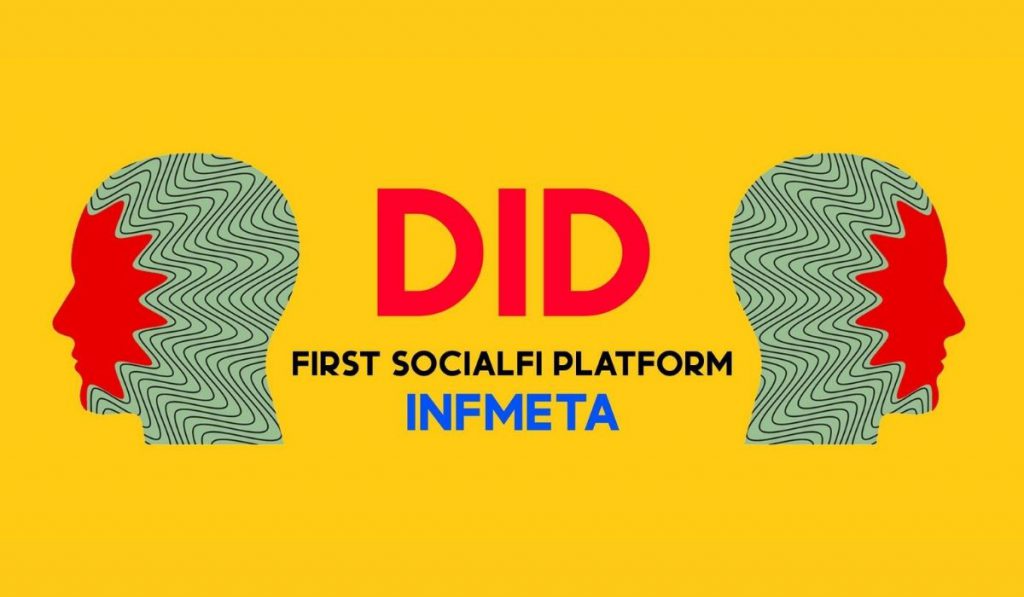Binance CEO Changpeng Zhao released a statement via Fortune magazine. “DeFi will soon see changes in 2021 and we can see some exciting and innovative developments in 2022, with SocialFi and GameFi being the main drivers,” he said. As DeFi grows, smart solutions will emerge to meet the needs of the community. Reports show that it is also gratifying that the global adoption of cryptocurrency will increase from 5% today to 20% in 2022.
SocialFi is not a new concept to the drawbacks of the social media platforms in Web 2.0. In terms of data privacy, these platforms in Web3.0, such as Infmeta, allow users to log in with a decentralized wallet, so users’ identities are hidden and only shown when they wish. In Web3.0, there is a new concept of Decentralized Identifiers (DIDs).
DIDs are a decentralized identity concept that has received much attention in recent years. It advocates abandoning the identity provider framework and returning ownership to the user. Imagine people managing personal assets through mobile apps and protecting sensitive information through biometrics and encryption.
Infmeta aims to solve the current problem of large service providers monopolizing user data and privacy, and also bring other benefits. For example, a hacker can’t get a large amount of user data through a single breach of a server because sensitive information only exists on a user’s phone.
DID could be one of the solutions to the current problem of large institutions acting as identity providers, such as cross-border vaccination passports or stateless refugee status, which are difficult to deal with by a single institution. My identity is declared by myself and determined by others. Infmeta’s idea is pure and well-intentioned, hoping that one day everyone will be the sovereign owner of their own identity rather than an institution.
 
 
At Infmeta, ownership of user data is returned to the user. However, in many cases, this so-called ownership does not make any sense in many scenarios. For example, AXIE, or similar NFT characters and equipment in Gamefi, does it make a difference if your so-called NFT is on the chain or on the server of Web2 gaming company when the game is cold and nobody cares?
I believe that many people in the past spent several ETHs to get an NFT which still lies in the wallet. In fact, it is a cool online game in the web 2.0 era. The final official account is deleted, there is no essential difference.
In other words, the lifespan of the so-called ownership of web 3.0 is still tightly bound to the lifespan of the project itself, but for some ownership, its lifespan can be bound to the lifespan of the chain itself. For example, your on-chain behavior,yYour on-chain relationship, your on-chain achievements, as long as ETH (or other chains) does not disappear for a day, your data will have meaning and will continue to grow!
This is where Infmeta comes into play.
SocialFi, the next trend in 2022?
As I have mentioned, Changpeng Zhao believes that this year will see an increase in investment from both traditional and crypto venture capital firms, and this funding will spur a number of innovative projects, increase cases and accessibility, and promote the global acceptance and adoption of crypto technologies. And as tech giants move into cryptocurrencies, he is optimistic that the global cryptocurrency adoption rate will jump to 20% from 5%.
SocialFi started being discussed in late 2021. It was one of the hottest topics in the global industry after NFT and GameFi. So why did it become a topic of discussion? As mentioned in the introduction, SocialFi aims to solve the long-standing monopoly of traditional social media platforms such as Facebook and Instagram, so that creators’ income is controlled by the platform and they have to pay for advertising to increase their exposure. SocialFi is a community built on a decentralized platform, eliminating the exploitation of centralized platforms. It gives creators more room for development.
5 Components of SocialFi
For now, SocialFi is still a very new concept, and there is no clear definition of what SocialFi is. However, SocialFi’s components can be roughly divided into Social, Content, DeFi, and DAO. Another element Infmeta has added is decentralized identifiers (DIDs).
- Social: platforms like Facebook and Instagram are successful because of the connections between communities. SocialFi takes this community and eleminates platform centralization to achieve the goals of Web3.0.
- Content: SocialFi is primarily built on creative platforms such as text, art, music, etc.
- DeFi (Decentralized Finance) : SocialFi projects release social tkens and NFTs to create value within the community.
- DAO (Decentralized autonomous Organization) : SocialFi does not have a centralized platform to manage the community. Instead, everyone contributes to the platform, so DAO (decentralized autonomous organization) is an important factor.
- DID (decentralized identifier) Your on-chain actions, on-chain relationships, your on-chain achievements all remain on ETH forever. This will be your best endorsement and credit.
SocialFi, NFT, DAO and Web3.0 are all intertwined
Think about Facebook, Twitter slowly building their social empires, when it comes to SocialFi, Web 3.0, NFT, DAO, DeFi, cryptocurrency, and Even SocialFi are all interdependent. Web3.0 needs daos, blockchain technology, and cryptocurrency to become a decentralized web. A DAO would need the mechanism of SocialFi to motivate users to run the organization, and NFT technology makes creators more organic and prominent. Infmeta’s model will revolutionize the way how social interactions work, tying together each concept and technology like a jigsaw puzzle into the shape of the crypto world.
Infmeta Twitter: https://twitter.com/The_infmeta
Infmeta Instagram: https://www.instagram.com/infmeta/


